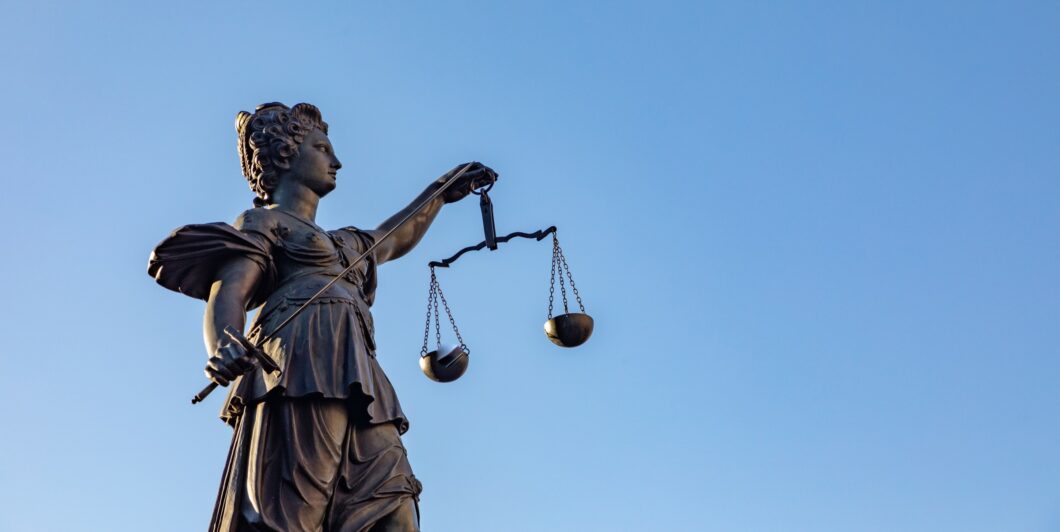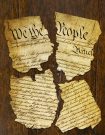Thinking About the Rule of Law
The rule of law is an essential component of constitutional order. Without it, the only constraint on power would be power itself: Might would always be right. Change in the political order could come only if the incumbent exhausted his power (because all available treasure had been spent or all available blood spilt) or if an insurgent accumulated more power (whether through wealth or force). Such a regime would hardly merit being called an order at all—and, at the least, it certainly would not be a constitutional one.
If we are to take the idea of constitutional order at all seriously, then, we find that we are pre-committed to the rule of law. That is, to the idea that there are limits imposed by law on power; that the powerful may not simply rule through whatever whim occurs to them today; and that those in positions of power, authority, or leadership are constrained—in theory and practice alike—by legal limits. In a well-functioning constitutional order, these are limits that a ruler may not free himself of—or, at the very least, they are limits that a ruler may not unilaterally free himself of.
Understood in this way, the rule of law is not especially complicated. It posits simply that rulers and those in positions of public authority (whether we call them kings or presidents, governors or congressmen, judges or police officers) enjoy only those powers that the law grants them. In the exercise of their powers, they will be accountable to law and if they purport to exercise powers which they do not have—whether wilfully or inadvertently—it is the task of the law to stop them. Crucially, all of this applies equally whether power is won in an election, inherited, or conferred by appointment. Even the most successful political candidate—even one commanding a great majority of popular support—may do in office only that which the law allows him to do. Such is the demand of the rule of law.
Jeremy Waldron has devoted the better part of a professional lifetime to thinking and writing about the rule of law. His most recent book—Thoughtfulness and the Rule of Law—collects eleven previously published essays, written over fifteen years between 2007 and 2021, and appends to them a reflective introductory essay in which Waldron draws out what he thinks their overarching themes are. He identifies three in particular: that the modern operation of the rule of law depends upon standards (such as fairness or reasonableness) as much as it does on rules; that the rule of law is not neutral, but is value-laden, expressing as it does a commitment to human dignity and to the dignity of human agency (it is, as such, a liberal value); and that procedure matters to the rule of law every bit as much as (and perhaps even more than) substance. Of these three themes I shall reflect in this review mainly on the first and the third.
I’m enthusiastic about what Waldron has to say about the third theme—indeed, I think it is the most important contribution his book makes—but I’m more cautious about the first theme. Let me explain.
I suppose we all want our leaders to be reasonable. I suppose we all want them to act fairly. I suppose none of us would prefer leaders who are capricious, brutal, uncaring, whimsical, unprincipled, or thoughtless. I also suppose, however, that we will not merely disagree but will reasonably disagree with one another about what the fair, principled, or thoughtful thing would be for a leader to do in any given circumstance. As the opening line of Waldron’s best book (Law and Disagreement) puts it, “There are many of us, and we disagree.” Who should then be empowered to decide whether a leader has or has not behaved reasonably, or fairly? In particular, is that judgment a legal one—a matter of the rule of law for a court to rule on—or a political one—a matter of public policy in respect of which the last word lies not with a Supreme Court but (in a democracy) with the electorate?
Waldron does not want to reduce the rule of law to a law comprised only of hard and fast rules. But herein lurks real danger. For the more we include within the scope of the rule of law the idea that judges and courts should enforce open-ended standards alongside sharp-edged rules, the more we blur the domains of law and politics—and, as we have seen, the very point of the rule of law is that it stands apart from (and above) mere politics.
To give an example: suppose it is a rule of constitutional law that “freedom of assembly may be limited only where necessary in a democratic society.” Suppose, further, a court rules that limits are “necessary in a democratic society” when they serve a “pressing social need” and when they are “proportionate.” This is not a fanciful example, for this is indeed the law across Europe, in Israel, in Canada, and in Waldron’s native New Zealand. Yet can a standard which means essentially that “freedom of assembly may be limited where it is judged to be fair and reasonable so to do” credibly pass as a rule of law? Is it not so vague and imprecise that whoever seeks to apply it in practice, whether legislator, governor, or judge, cannot but rely on their personal policy preferences to decide when the standard has been breached and when it has been complied with?
Academic lawyers spend a disproportionate amount of their time poring over and arguing over case law and focus too little on legislation—on democratic law-making.
The solution is to be much bolder than Waldron’s thesis: the rule of law entails, whether we like it or not, a legal system that cleaves closely to rules and leaves looser talk of standards and principles for the domain of politics. Law works best when it is readily distinguishable from politics—it is when the two are pushed so close together they start to blend that law loses its authority and the rule of law loses its grip. In his earlier work, Waldron was quicker to recognise this than he is in this new book: this was true, for example, not only in Law and Disagreement (1999) but also in his famous 2006 law review essay on “The Core of the Case Against Judicial Review.”
Where Waldron is at his best in Thoughtfulness and the Rule of Law is when, towards the end of the book, he turns to questions of legal procedure, due process, and legislative procedure. He is right to point the finger at his fellow legal theorists for devoting too little attention to these matters, and he is persuasive in his claims that no successful—indeed, no thoughtful—account of the rule of law can afford to overlook them. The essays which touch on this theme reheat some of the most insightful elements of the Waldron back catalogue, notably the lectures on The Dignity of Legislation which he turned into a short book a quarter of a century ago. Academic lawyers in general and legal theorists in particular spend a disproportionate amount of their time poring over and arguing over case law and focus too little on legislation—on democratic law-making. Of course, there are exceptions—and Waldron is one of them—but they remain few.
Waldron is right, too, that apparently arcane (or even mundane) aspects of courtroom process are anything but. His essay on how stare decisis and the law of precedent are integral to the rule of law is compelling. Or, at least, it was. When this essay was first published (in the Michigan Law Review in 2012), the Supreme Court’s judgment in Planned Parenthood v Casey was the leading authority on the matter, and Waldron pays careful and considered attention to that case in his essay. But things have now changed, Dobbs having overruled not only Planned Parenthood v Casey but also Roe v Wade, the case upon which Casey’s analysis of precedent focused. All this happened in plenty of time before Thoughtfulness and the Rule of Law went to press for Waldron and his editors at Harvard University Press to have realised that his work on this crucial aspect of the rule of law needed to be revisited and updated. Not to have done so is unimpressive. That one of the book’s most thoughtful essays is already so badly out of date is—well—not very thoughtful.
I have one other gripe—and that is with the range of other authors and scholars Waldron chooses to engage with in these essays. The range is remarkably limited. Waldron is, of course, a leading Anglo-American analytical legal philosopher. That is his home ground, and he comes back to it with persistence and regularity. His fellow travellers, Hart, Dworkin, Fuller, and Raz, enjoy more appearances in the book (and its index) than almost anyone else. The only exception is Hayek, whose work on the rule of law Waldron engages with only, in the main, to disagree with it.
I am struck by Waldron’s title (I often am: Law and Disagreement and The Dignity of Legislation are likewise striking and inviting titles) but, I have to say, if I were seeking to recommend a truly thoughtful book on the rule of law, Waldron’s would not be top of my list. David Dyzenhaus has done more than anyone else I know to wrestle with the problems of how to make the rule of law a meaningful concern in the context of emergency powers. His work is genuinely thoughtful on the rule of law, yet Waldron ignores it. TRS Allan is another writer, who has done more than anyone else I know, to grapple with how the rule of law fits into the changing dynamics of an uncodified constitution, yet Waldron overlooks his work entirely. German authors such as Robert Alexy and Bernhard Schlink have written both thoroughly and thoughtfully about proportionality and the rule of law, as have David Beatty in Canada, Aharon Barak in Israel, and many others elsewhere. Waldron cites not a single one of them in his book. Tom Bingham, as Lord Bingham, who was the UK’s top judge for nearly a decade (the British equivalent of the Chief Justice of the US Supreme Court) wrote a powerful, punchy, and brilliant short book on the rule of law shortly before his death in 2010, yet it merits only the briefest and most cursory of mentions by Waldron. I could go on, but you get the point. The last twenty years have seen a flourishing of the most thoughtful, profound, reflective, and challenging books about the rule of law, its strengths and limitations, its achievements and ongoing challenges. None of this work was written by the men Waldron would prefer to engage with—the Harts and Fullers, Razes and Dworkins of his world. Jeremy Waldron indeed is one of the more thoughtful of the orthodox Anglo-American legal philosophers. But for the most thoughtful work on the rule of law, I would not start here.

